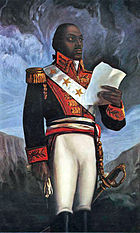1842 Slave Revolt in the Cherokee Nation
| North American slave revolts |
|---|
 |
|
The 1842 Slave Revolt in the Cherokee Nation, then located in Indian Territory (Oklahoma) west of the Mississippi River, was the largest escape of a group of slaves to occur among the Cherokee. The slave revolt started on November 15, 1842, when a group of 20 African-American slaves owned by the Cherokee escaped and tried to reach Mexico, where slavery had been abolished in 1836. Along their way south, they were joined by 15 slaves escaping from the Creek in Indian Territory.
The fugitives met with two slave catchers taking a family of eight slave captives back to Choctaw territory. The fugitives killed the hunters and allowed the family to join their party. Although an Indian party had captured and killed some of the slaves near the beginning of their flight, the Cherokee sought reinforcements. They raised an armed group of more than 100 of their and Choctaw warriors to pursue and capture the fugitives. Five slaves were later executed for killing the two slave catchers.
What has been described as "the most spectacular act of rebellion against slavery" among the Cherokee, the 1842 event inspired subsequent slave rebellions in the Indian Territory. But, in the aftermath of this escape, the Cherokee Nation passed stricter slave codes, expelled freedmen from the territory, and established a 'rescue' (slave-catching) company to try to prevent additional losses.
Prior to European contact, the Cherokee had a practice of enslaving prisoners of war from other Indian tribes. In the late 18th century, some Cherokee set up European-American style plantations on their Cherokee Nation land, which occupied territory near parts of Georgia and Tennessee. They purchased African-American slaves to work this land. In 1819, the Cherokee Nation passed slave codes that regulated slave trade; forbade intermarriage; enumerated punishment for runaway slaves; and prohibited slaves from owning private property. An 1820 law regulated trading with slaves, requiring that anyone who traded with a slave without the master's permission was bound to the legal owner for the property, or its value, if the traded property proved to be stolen. Another code declared that a fine of fifteen dollars was to be levied for masters who allowed slaves to buy or sell liquor.
...
Wikipedia
